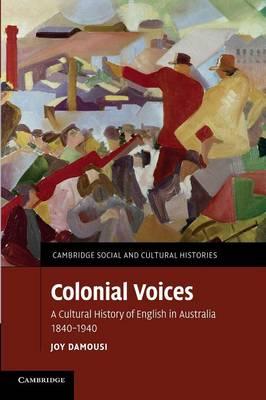Full Product Details
Author: Joy Damousi (University of Melbourne)
Publisher: Cambridge University Press
Imprint: Cambridge University Press
Volume: v. 15
Dimensions:
Width: 15.20cm
, Height: 1.70cm
, Length: 22.90cm
Weight: 0.440kg
ISBN: 9781107673373
ISBN 10: 1107673372
Pages: 326
Publication Date: 23 January 2014
Audience:
Professional and scholarly
,
Professional & Vocational
Format: Paperback
Publisher's Status: Active
Availability: Manufactured on demand

We will order this item for you from a manufactured on demand supplier.
Reviews
Review of the hardback: 'In this book Joy Damousi shows that imagination has ears. She sketches a great ant-nest of sound, the sound of Australian voices in the past, and shows how they were regulated and reformed, restricted and empowered. This is a path-breaking book, brilliantly researched and beautifully written. Joy Damousi shows that the Australian sense of self is much more complicated than we ever thought. Shifting ideas about speech, and about the right way to speak, have been crucial to the question of national belonging, more subtle than skin colour but maybe just as powerful.' Alan Atkinson, University of Sydney and author of The Europeans in Australia Review of the hardback: 'One of Australia's most distinguished historians, Joy Damousi has now turned her attention to language and speech. This wide-ranging book captures insights into aspects of Australian history from colonial race relations to elocution and public oratory; education, class and gender; and questions of accent surrounding the advent of radio and 'the talkies'. The result is a rich and fascinating account that shows how sound is at the very core of culture and history.' Angela Woollacott, Australian National University and author of Gender and Empire Review of the hardback: 'A lively and engaging overview, probing the ways in which images and ideologies of language - particularly in terms of speech and voice - can variously be deployed (and redeployed) in the contexts of Australian English and its own historical trajectories. Joy Damousi makes use of a range of innovative primary material, to explore some of the colonial legacies of language attitudes which have their political and socio-cultural origins in the heyday of Empire.' Lynda C. Mugglestone, University of Oxford and author of Talking Proper: The Rise of Accent as Social Symbol Review of the hardback: '... a highly original study of the relationship between language and empire and the centrality of voice and pronunciation in defining individual and collective identity.' The Historical Association (history.org.uk)
Author Information
Professor Joy Damousi is Head of the School of Historical Studies, University of Melbourne. Her previous publications include Depraved and Disorderly: Female Convicts, Sexuality and Gender in Colonial Australia (1990), The Labour of Loss: Mourning, Memory and Wartime Bereavement in Australia (1999), Living with the Aftermath: Trauma, Nostalgia and Grief in Post-War Australia (2001) and Freud in the Antipodes: A Cultural History of Psychoanalysis in Australia (2005; Winner of the 2006 Ernest Scott Prize).




